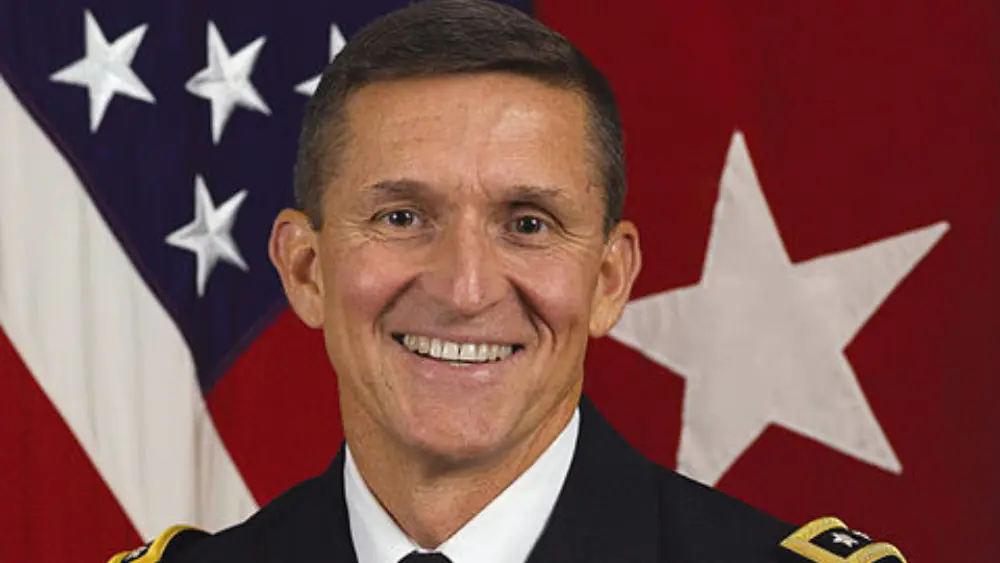Michael T. Flynn, born on December 24, 1958, in Middletown, Rhode Island, is a retired United States Army lieutenant general who rose to prominence as an influential figure in national security and military intelligence. Throughout his career, Flynn held key positions in the U.S. military and the intelligence community, offering a unique and often controversial perspective on national security issues.
Early Life and Military Service
Michael Flynn’s journey into military service commenced during his time at the University of Rhode Island, where he participated in the Reserve Officers’ Training Corps (ROTC) program. His commitment to military service was solidified when he graduated in 1981, receiving a commission as a second lieutenant in the field of Military Intelligence. This early step in his military career marked the beginning of a path that would lead him to become a prominent figure in the United States military.
Flynn’s tenure in the military, characterized by his dedication and expertise in intelligence, would later see him assume critical roles within the U.S. Army and the broader national security community. His journey from the ROTC program to becoming a seasoned military intelligence officer laid the foundation for the remarkable career that would follow.
Michael T. Flynn: Intelligence Officer
During his early military service, Michael T. Flynn distinguished himself as an intelligence officer. This phase of his career was characterized by his engagement in various assignments within the realm of military intelligence. In these roles, Flynn honed his skills in collecting, analyzing, and disseminating critical information that was integral to supporting military operations. His work in the field of intelligence not only demonstrated his aptitude for strategic thinking but also highlighted his dedication to providing decision-makers with the vital insights necessary for effective military planning.
Flynn’s early experiences as an intelligence officer set the stage for the significant roles he would later assume within the intelligence community and national security apparatus. His expertise and contributions in this field would become increasingly prominent as he progressed through his military career and beyond, shaping his reputation as a leader and expert in the realm of intelligence and security.
War on Terror
Michael Flynn’s military career coincided with the tumultuous period following the September 11, 2001, terrorist attacks, which marked the onset of the War on Terror. During this critical era, Flynn held pivotal positions within the intelligence and counterterrorism domains. Notably, he served as the Director of Intelligence for the Joint Special Operations Command (JSOC), where he played a vital role in providing intelligence support for special operations forces engaged in counterterrorism missions. His leadership and expertise in this capacity were instrumental in addressing the complex and dynamic challenges posed by global terrorist organizations.
Flynn’s contributions to the nation’s security extended further as he assumed the position of Director of the Defense Intelligence Agency (DIA). In this role, he oversaw a vast intelligence organization responsible for providing critical insights and analysis to the Department of Defense and the broader U.S. national security apparatus. His experiences in these key positions endowed him with a deep understanding of the evolving threats facing the United States in the post-9/11 landscape, solidifying his reputation as a leading figure in intelligence and counterterrorism efforts.
Michael T. Flynn: Controversies
Michael T. Flynn’s career was punctuated by a series of controversies, particularly during his tenure as the Director of the Defense Intelligence Agency (DIA). During this period, he often found himself in contentious situations due to his outspoken views on terrorism and the Middle East. Flynn’s advocacy for more assertive policies and his willingness to challenge conventional wisdom sometimes placed him in opposition to the prevailing views within the Obama administration. These differences in approach and perspective led to clashes with his superiors and ultimately contributed to his departure from the DIA.
Flynn’s propensity for controversy continued beyond his military service when he became a central figure in the political arena. His involvement in the 2016 presidential campaign and his brief tenure as National Security Advisor under President Donald Trump drew significant attention and controversy, particularly surrounding his interactions with foreign officials and his legal issues related to the investigation into Russian interference in the election. These controversies further cemented Flynn’s status as a polarizing and high-profile figure in American politics and national security.
Retirement and Political Involvement
Following his retirement from the military in 2014, Michael Flynn transitioned into the realm of politics, where he would play a prominent and influential role. His entry into the political arena gained widespread attention when he became an advisor to Donald Trump during the 2016 presidential campaign. Flynn was known for his advocacy of a more assertive and hawkish approach to national security and foreign policy, aligning himself with Trump’s positions on these critical issues.
As an advisor to the Trump campaign, Flynn’s influence on the campaign’s messaging and policy positions was notable. His outspoken views and alignment with Trump’s positions resonated with a segment of the electorate, contributing to the campaign’s appeal to certain voters. This political involvement marked a significant departure from his previous career in the military and intelligence community, and it further solidified his place as a key figure in the political landscape.
Michael T. Flynn: National Security Advisor
Michael T. Flynn’s appointment as National Security Advisor under President Donald Trump marked a pivotal moment in his political career. However, his time in this crucial role was overshadowed by controversy, most notably concerning his communications with Russian officials. Flynn’s interactions with Russian Ambassador Sergey Kislyak drew significant scrutiny and raised questions about the nature of those discussions, including the possible violation of protocols and regulations governing diplomatic contacts.
The controversy surrounding Flynn’s communications with Russian officials ultimately led to his resignation as National Security Advisor in February 2017, less than a month into the Trump administration. His departure from the position marked a tumultuous chapter in the early days of the Trump presidency and further fueled debates about national security and foreign policy in the United States.

Legal Issues and Pardon
In the aftermath of his resignation as National Security Advisor, Michael Flynn became embroiled in legal proceedings related to his communications with Russian officials. These legal issues included charges of making false statements to federal investigators. Flynn’s legal troubles garnered extensive media attention and became a focal point of political debates surrounding the Trump administration’s interactions with Russia.
In a significant turn of events, President Donald Trump issued a pardon for Michael Flynn in November 2020. The pardon effectively granted Flynn clemency for any potential criminal liability related to his actions and statements during the investigation into Russian interference in the 2016 election. This decision to pardon Flynn brought an end to his legal entanglements and marked a point of contention in the ongoing national discourse over the Trump administration’s handling of investigations and legal matters related to Russian interference.




